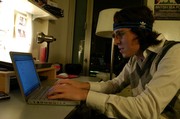
Image: Toby Hicks/The Daily Pennsylvanian
College sophomore Matt Abess,
who will be an apprentice for Penn English lecturer
Kenneth Goldsmith this spring, works on his
laptop in his dormitory room

The following is an article published in The Daily Pennsylvanian. It can also be found here.
An image (PDF) of the article can be seen here.

But a program created by the Center for Programs in Contemporary Writing is flipping these roles, and organizers say students are better off for it.
Created in 2003, the Writing Apprenticeship Program gives three students the opportunity to work closely with a working writer during their spring semester.
The students get course credit for their work, but most of their duties lie outside the classroom. They help edit sections of the professors' work or piece together their research.
The inspiration for the professor-student relationship comes from the old notion of a novice learning a trade by watching a master do the work. The program was born from a 2003 discussion between English professor Al Filreis and then-College of Arts and Sciences Dean Rebecca Bushnell.
Filreis, director of the Contemporary Writing Center, believes that "writing is something that can be learned by watching."
The program aims to give students an idea of the sort of problems that writers face and the critical skills necessary to take on projects for publication.
Filreis feels strongly that the best model for learning is a "talented, eminent and experienced writer" pairing up with a "young, talented person who still has a lot to learn."
Students apply to the program during the fall semester and, if selected, work with their assigned faculty member in the spring. This year, about 30 students applied for the three spots.
Jennifer Snead, director of the Kelly Writers House, said that as apprentices, students have a chance to develop "the kind of relationships that would last for a long time."
In fact, Writing Fellow Thomas Devaney is still in touch with an apprentice from two years ago, even though the student is currently in England pursuing a master's degree.
Devaney said that "writing is all about making decisions, and I trusted my apprentice, so I took her advice on many things."
English professor Paul Hendrickson also had an apprentice last spring who helped him with material on the life of Ernest Hemingway. Hendrickson said he had "received so much mentoring from prominent figures" in the past that the program was a "way to give back."
2005 College graduate and former Daily Pennsylvanian columnist Jessica Lussenhop was Hendrickson's apprentice. The hours she spent in the University Museum of Archaeology and Anthropology looking at rare documents regarding Hemingway's married life in Cuba culminated in a research paper she presented at the end of the term.
"It was a great honor to be doing the program ... and professor Hendrickson trusted me with the independent research," Lussenhop said.
The apprenticeship program is often confused with an independent-study class, but there are basic differences. Filreis said that in an independent-study class, students "shop around" for research but that the apprenticeship program is designed so that students focus on the specific work of their mentor.
College sophomore Matt Abess was one of those chosen to be an apprentice next semester. He knows English lecturer Kenneth Goldsmith from previous classes and said he is "excited by the real-world application" of working with him.
Although Abess said he is not nervous about the prospect of working with a more experienced writer, Snead said that some students may be intimidated by the idea.
"It must take bravery from students to critique professors' writing," Snead said.
Hendrickson said that there is "always the anxiety of a younger, inexperienced writer" but that it is just another challenge for students to overcome.